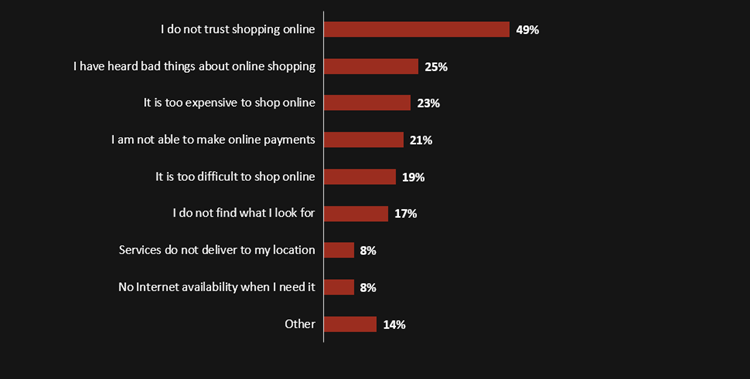Online Shoppers are Increasingly Concerned about their Privacy
51 percent of Global Citizens with internet access are discouraged by the lack of trust online, choosing to not engage in online transactions due to privacy and security concerns, a new Ipsos survey for the Centre for International Governance Innovation has found. This situation does not only restrain the digital economy from growing but also necessitates a riddle for online retailers striving to thrive personalization.
"The lifeblood of the Internet is trust, and when that is damaged, the consequences for the  digital economy are nearly irreparable," said Fen Osler Hampson, director of CIGI's Global Security and Politics program, in the release. "The results of this global survey offer a glimpse into why policymakers should be concerned, and why there is a strong link between user trust and the health of e-commerce."
digital economy are nearly irreparable," said Fen Osler Hampson, director of CIGI's Global Security and Politics program, in the release. "The results of this global survey offer a glimpse into why policymakers should be concerned, and why there is a strong link between user trust and the health of e-commerce."
The study surveyed 24,225 Internet users in 24 countries, also revealed that, of the one in five global citizens (22%) who never buy goods or services online, half (49%) refrain from online shopping as they simply do not trust. Furthermore, among the respondents worried about their privacy, listed concerns are cyber criminals (82%), internet companies (74%), and governments collecting customer data (65%).

How Should Businesses Address the Trust Issue?
As the Internet evolves and thrives, it infiltrates more and more all aspects of our lives. We remain a trail of data whenever we interact with sites, no wonder why the issue of data privacy gains salience. On the other hand, even here at CMS-Connected, there is hardly a day that goes by without discussing how personalization is paramount for cultivating a consumer loyalty. So the challenge for e-commerce is to construct an environment of trust that maintains a level of personalization.

Nevertheless, don’t let these fears stunt your business growth! Instead, keep reading to learn more about some proven tactics to banish your visitors’ doubts about online shopping:
-
Get some feedback from your visitors. The market researches are great to gain insights on consumer behavior but to make sure if the results you have read are applicable for your visitors, the best way is to communicate with them. It can be done by a simple one-question poll or survey on your website or social channels, asking: “Is there anything deterring you from making a purchase today?” That way, you would not only potentially find out the primary reason for holding them back from online shopping on your website but also convey a message saying that you care about their concerns and fears which ultimately contributes to building trust between your brand and prospects.
-
Have a clear online store presentation. When we see a website with loads of unappealing graphics and advertisements thrown everywhere and overcrowding the page, naturally we all move the cursor over to the right-hand corner of the page to close it, let alone sharing the details of our credit card information. So it is pretty obvious that poor design and unfavorable user interface will make visitors bounce away even before they browse what the business has to offer. However, a clear online store presentation to build credibility for your online website goes beyond design and user interface as people are seeking for reassurance whether or not the store is actually real. To allay that fear, including customer testimonials, placing the social buttons link to your company’s social media platforms that you are active on, any third party endorsement and accommodating an ‘About Us’ page with “real” photos and/or videos of the team and the founders can go a long way.
-
Use a website scanner to remove malware from your eCommerce site. Nearly 1 million new malware threats are released each day, and cyber criminals get unauthorized access to your site to steal sensitive data such as credit card information through that malware. Before ensuring your customers that their information is in safe hands and their data hasn’t been compromised, first, you need to make sure your online store is not a malware-infected website. To detect and expel malware from your website, running a website scanner on your site would be a wise solution.
-
Place a presence of a trust badge at strategic locations. Karsten Lund, a conversion specialist, discovered a 32% increase in conversions with the presence of a trust badge on the site. Rubbing off trust on an e-commerce site is a must for every online retailer. To that point, the familiar logos from external accreditors such as McAfee, Verisign, Paypal, BBB, and TRUSTe can assure prospects that the website is safe to hand over their credit card information. More importantly, placing a privacy policy on your website, stating that their information is in safe hands and elaborating clearly on the use of any information gathered to inform your customers can definitely make a difference. A comprehensive privacy policy should include at least what information is collected, how this information is used, and how this information is shared. Besides all these, a Secure Sockets Layer (SSL) button also eases their fears.
-
Empower your customers with their personal information. With ever-changing customer expectations, the days are long gone when businesses hide behind the thin veil of, “but that was included in our Privacy Policy.” To win your customers’ trust, your business should be proactive and nimble when it comes to conflicts or changes. More importantly, businesses always have to make their customers feel secure and empowered. For instance, if your customers want you to revoke their information associated with their accounts, your job is to make the process a breeze instead of throwing the rule book at them.
-
Train and educate your employees. Access to mission-critical systems should be restricted based on their roles, and those who are granted an access to sensitive data should be educated about the importance of the data security and the dangers of potential cyber attacks.
-
Replace your legacy software or hardware with a modern solution. Online retailers should invest more in new technology with built-in security protocols and authentication systems. It is important to stay on the top of the new technology when it comes to data security of your organizations and your customers as the software written years ago can no longer prevent a data breach as it was developed to meet a certain need at the time, and most likely, things have moved on since then.
-
Be aware of local consumers’ expectations. As global markets are becoming increasingly diverse and connected, businesses have started broadening their footprint into foreign markets. In fact, the study stated in the opening paragraph also unveiled that 55% of those surveyed said that they would prefer to buy items made in their own country. However, just like other consumer behaviors, the level of the lack of trust varies and can be more serious in certain regions more than others. In fact, the same study found that e-commerce platforms in the Middle East, Africa, and Latin America will be more impacted by privacy concerns and trust issues. Moreover, Indonesia (96%) has the highest incidence of people who say cyber criminals are driving their increased concern about online privacy, followed by South Africa (91%), Mexico (90%), Brazil (86%), the US (86%), Canada (85%), Great Britain (85%), Hong Kong (China) (85%), South Korea (85%), Sweden (85%), France (84%), Australia (81%), Italy (81%), Poland (80%), Nigeria (79%), Germany (78%), China (76%), Turkey (75%), India (73%), Japan (73%), Kenya (73%), Tunisia (72%), Egypt (68%), and Pakistan (67%). Additionally, there are also some region-specific expectations that companies operating there need to be aware of. For instance, publishing special on-site verbiage called an “impressum” is an essential trust mark for German consumers. Meanwhile, in South Korea, seeing the preferred payment methods are accepted on-site has a huge impact on conversions, so much so that global brands usually generate only 20 percent of what they’d otherwise earn when they don’t support local payment types in South Korea.
Another interesting finding from the study was that more than 86% of users in China, India, and Indonesia noted they expect that they will make smartphone-based mobile payments within the next year. However, only 30% of users in France, Germany, and Japan said the same. See how to combat mobile commerce fraud here.
My POV
Even though it seems that the concerns around website privacy and security create a dilemma for retailers on the quest for personalization, in a study conducted by Accenture, the majority of consumers in both the US and UK found they were eager to have retailers they trust use some of their personal data in order to provide personalized and targeted products, services, recommendations, and offers. So it means that consumers are just looking for a fair trade in exchange for their data which is a reasonable expectation, after all. However, there is still a remarkable gap between online retailers’ efforts in convincing their visitors to make an online purchase and consumer response to those initiatives. Call me optimistic, but to me, therein lies the opportunity for retailers to differentiate themselves from the ever-evolving commerce space by conveying clear security messages as well as offering multiple financing choices and the most trustworthy payment methods. Well, of course, they all will move the needle only if your website already delivers seamless and relevant experiences across channels and devices. If you are interested in learning more about the ways of improving your e-commerce content strategy, I highly recommend you read one of our most popular e-commerce articles entitled How to Drive Sales with Your eCommerce Content Strategy.

Venus Tamturk
Venus is the Media Reporter for CMS-Connected, with one of her tasks to write thorough articles by creating the most up-to-date and engaging content using B2B digital marketing. She enjoys increasing brand equity and conversion through the strategic use of social media channels and integrated media marketing plans.